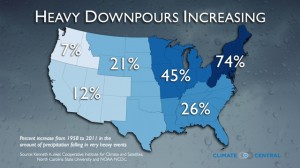March 12, 2014 – Three items came across my desk the last few days and all of them relate to the risks and challenges we face globally by failing to act or ignoring the evidence of climate change.
The first is a Federal Advisory Committee Draft Climate Assessment produced by the U.S. Department of Commerce. The contributions of 240 authors have gone into this report. In it the report concludes that “climate change is already affecting the American people.” It goes on to state that “evidence for climate change abounds, from the top of the atmosphere to the depths of the oceans.” The single most noticeable evidence is the increase in average U.S. temperature of 1.5 Fahrenheit (0.83 Celsius) degrees since 1895 with 80% of that happening since 1980. The consequences of a warmer, more turbulent atmosphere are being seen in extreme weather events with heavier than normal downpours (see map below), significant temperature swings over short periods of time, higher summer nighttime temperatures, and prolonged drought conditions in already vulnerable climate zones.
Additional report findings include the following:
- Climate change is threatening the health of Americans.
- Infrastructure is being adversely affected from coastlines to roads, buildings, ports, rivers, farms, aquifers and wells, and energy facilities.
- Surface and groundwater supplies are being adversely impacted particularly in the American west.
- Disruptions to agricultural production are expected although the sector is coping better than expected because of new technologies and crop varieties.
- Biodiversity and natural ecosystems are diminishing.
- The ocean is changing, getting warmer and more acidic and this is affecting fisheries, coastal coral reefs, and coastal communities.
- Although there is some government efforts at all levels to implement adaptation and mitigation programs, the current level of activity is insufficient “to avoid increasingly serious impacts of climate change that have large social, environmental and economic consequences.”
The second item is an interview given by Rajendra Pachauri, Chairman of the UN Intergovernmental Panel on Climate Change. to the Financial Times of London in which he prefaces the upcoming newest IPCC report. Dr. Pachauri notes that the cost of containing climate change continues to rise as governments procrastinate in taking action to reduce emissions. In the newest IPCC report he states, “We will be looking at the costs of mitigation in next month’s report but in our last report in 2007, we said if you want to stabilise temperature increases to no more than 2C – 2.4C at the least cost, then 2015 is the year when C02 emissions will need to peak.”
The Financial Times article goes on to describe the failure of the United States and China, the world’s two biggest emitters of CO2, to commit to binding reductions in greenhouse gases. This is seen as the largest stumbling block to achieving a global solution to climate change. And although a new treaty is being negotiated to be signed by the nations of the world in Paris in 2015, without the U.S. and China providing leadership, all other efforts (some 500 climate laws have been passed by the nations of the world to-date) will be moot.
The third item is an article also appearing in the Financial Times of London entitled, “Idea of benefits in climate change wrong, says UK chief scientist.” The chief scientific adviser to the government of the United Kingdom in response to Members of Parliament puts the kibosh on arguments that climate change will provide more benefits than harm. His comments come in response to a science journalist, Matt Ridley, who has written The Rational Optimist in which he states that global warming will produce more benefits than harm in this century.
What disturbs me most about Ridley’s assertions is the attempt to pooh pooh climate models as being flawed and therefore the data they produce as being suspect. For climate change skeptics this is the point of contention. The climate models are inaccurate. Climate change has always been happening and there is little evidence that the current changes have anything to do with us. So why not wait and do nothing until the models improve before tackling what may prove to be a mere inconvenience, a few degrees of change that may only last a few decades. I even have readers who have argued that more CO2 is good. It will lead to bumper yields in crops. Isn’t that sort of like ignoring the elephant in the room?
And two final thoughts.
In today’s Toronto Star, the Canadian government is indicating its intentions of further reducing staff at Environment Canada making cuts to climate programs. See the elephant above? The Canadian government doesn’t.
And finally yesterday in Toronto the temperature reached 10 Celsius (50 Fahrenheit), the warmest day we have seen since December of last year. Today we expect to have 10-15 centimeters (up to a half foot) of snow and wind chills that will feel like -27 Celsius (- 17 Fahrenheit). Just another sample of the whacky swings in weather that this city and much of Eastern North America has experienced throughout the winter of 2013/14. Yes, it’s weather but is it evidence of a changing climate? I think so!

















Len, the pessimist in me knows that all your rational evidence will continue to be ignored. A good question is, why is it so easy to do so? I think it is as simple as this: climate manifests itself as weather, weather is by its nature highly variable, with the result that data relating to climate are highly noisy and difficult to derive incontrovertible conclusions from. So as long as it is relatively easy to mine such noisy data and come up with apparently contradictory conclusions, weather-based evidence for climate change will always be ineffective for proof beyond a reasonable doubt (or whatever other threshold is applicable for decision making).
However, the optimist in me has hope. Maybe the solution is as simple as mining data that are less variable, noisy and tainted with controversy. For example, (and I am no expert here) horticultural data such as blooming dates and entomological data such as patterns of expansion of insect populations are climate-linked and I expect much less noisy. At the level of individual experience, a new bug in the back yard is not nearly as motivating as our recent foot of snow in thinking about how climate change affects me, but that is probably a good thing since it subtracts much of the emotional impact and may enable rational argument to trump wilful ignorance.
Not that rational argument seems to have much impact at any level of government these days, but at least it is a start (the pessimist always seems to get the last word…).